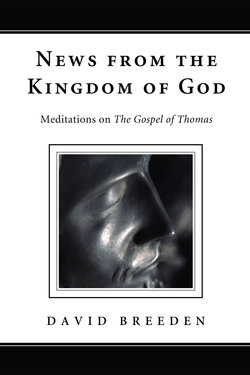Читать книгу News from the Kingdom of God - David Breeden - Страница 6
На сайте Литреса книга снята с продажи.
Foreword
ОглавлениеWhen David Breeden invited me to write a foreword to his meditations on the Gospel of Thomas, I was tempted to write, simply, read.
If you lean toward first thought, best thought, feel free to skip the next few paragraphs for the time being and jump in now. They’ll still be here if, when you get to the end, you choose to return to this beginning.
David’s translation and meditations speak for themselves, and they speak in a lively, direct tone appropriate to a peasant poet deeply attentive to the world that embraced him right where he was, painfully aware of its problems, convinced of its possibilities, passionate about its promise. David takes up this most gnostic gospel in part because the Church didn’t. Since its rediscovery, the text has been an important source for interpreters hoping to find in it words of Jesus uncontained by ecclesial structures and institutions that evolved over centuries to contain them as well as proclaim them. Here, they come free of the life meticulously woven in the process of weaving a Church. Here, readers encounter a poet in his poems—or, more properly, two poets engaged in the dance translation dances at its best. The Jesus of Thomas is here, but so is the translator, a poet in this case who thinks enough of another’s poems to dance them again, to invite readers to dance them again and again.
Ernesto Cardenal, another contemporary poet who has spent a great deal of time dancing about the architecture of the words at the heart of the good news Jesus was said to proclaim, has translated the words at the beginning of that good news simply and directly: revolution now. What follows then (and David picks this up in his citation of the Epistle of James) is being about what revolution is about, always a matter of debate. As Mark reported them, as I understand them, the words were, God’s reign is now, so close you can touch it; now turn and act as though you believed it.
Yes, a kind of dance: to turn, turn, will be our delight, till by turning, turning we come round right.
Practice makes perfect, they say, and that folk wisdom is a good thought with which to begin. Jesus, particularly the Jesus of David Breeden’s Gospel of Thomas, is a poet who, like countless rabbis and prophets before and after, believes himself part of a community that is deeded, not creeded: there is no creed but deed. By their fruits you will know them, this poet is reputed to have said in speaking of prophets true and false, and there is a bountiful harvest here.
Knowing it well, I think, will drive us out of our minds (a surprising outcome for a gnostic gospel, but this is good news that thrives on paradox), where, embodied, we can be about being the beloved community, a body that does justice, loves kindness, walks humbly, and knows nothing more divine.
Steven Schroeder
Chicago, Illinois
